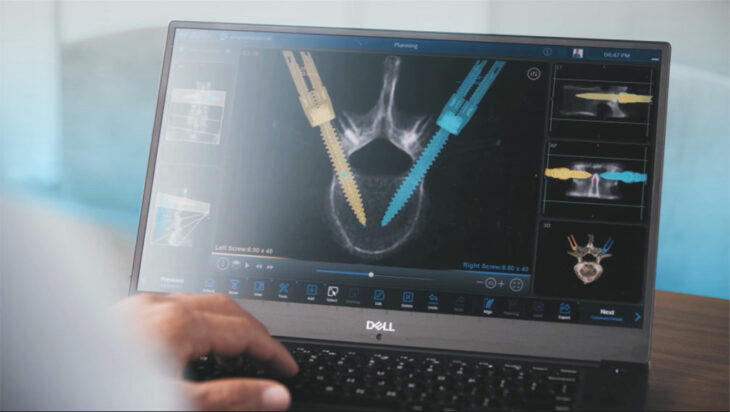Photo by Medtronic
By Dr. Eric Wolfson
Chances are that you or someone you know suffers from back pain, which can become more chronic over time. Although back pain is not always an indicator of a more serious disorder of the brain, spine, spinal cord or peripheral nerves, certain signs can signal a need for corrective surgery.
Obvious signs of these disorders include headaches, visual changes, confusion, lethargy, upper extremity or lower extremity pain with numbness and tingling, neuropathic pain and lower back pain. Nearly 65 million Americans report a recent episode of back pain to their doctors, leading to decreased productivity and physical limitations.
Although men are more likely to incur traumatic spine injury, women typically seek treatment for neuropathic pain, often described as a shooting or burning sensation. When a patient is finding that these symptoms interfere with normal daily activities, surgery is recommended.
Since the technology was introduced to Memorial in 2018, neurosurgeons at Memorial Hospital have performed nearly 100 robotic-guidance spine surgeries. The robotic navigation system of the Mazor X platform provides a level of precision that is especially critical in operating around the delicate and intricate regions of the spine. Working with special software, cameras and detailed 3D scanned images, the neurosurgeons plan and verify every aspect of the procedure. The neurosurgeon then guides the robotic arm to position each tool and implant with millimeter accuracy.
I have performed more than 90 robotic spine surgeries using the powerful 3D surgical planning software and pre-operative CT scans of the patient. With the Mazor X system, I develop a computer-aided plan, so I know exactly where and how to direct the movement of the robotic arm, a minimally invasive tool giving us enhanced precision and an even a higher level of control. Lower complication rates, reduced pain and faster recovery are reasons why robotic spine surgery in the hands of a neurosurgeon could be a great option.
The most common disorders treated with the Mazor X System include lumbar spinal stenosis, degenerative changes with lower back pain and lower extremity pain. Memorial has the only board-certified neurosurgeons on the Mississippi Gulf Coast, specializing in minimally invasive techniques to treat these disorders.
Keeping your body-mass index within normal limits, eliminating tobacco use or smoking and exercise are preventative measures women and men can take to reduce these issues.
Dr. Eric Wolfson is a Memorial neurosurgeon and director of neurosurgery. To learn more about the spinal robotics technology available at Memorial Hospital at Gulfport, email RoboticSpine@mhg.com or call (228) 867-4856.


